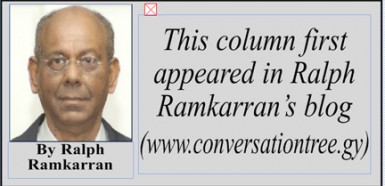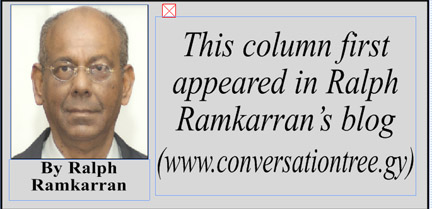General Secretary of the PPP, Home Affairs Minister Clement Rohee, declared at his press conference last week that the PPP has no problem with shared governance and the ‘winner does not take all’ principle. After all, he said, the PPP established its Civic component in pursuit of the realization of ‘winner does not take all.’ In the General Secretary’s analysis, the obstacle to the achievement of shared governance is the absence of trust between the PNCR and the PPP.
There is no distinction between the two. They are one and the same thing.
Just as shared governance means sharing between winner and loser, so ‘winner does not take all’ means sharing between winner and loser. But the PPP as well as the Civic are winners all the way. They are on the same list of candidates. The ‘winner does not take all’ system cannot therefore be accomplished by the PPP having the Civic as partners.
After the 2001 general elections the PPP came under intense pressure to share political office with the then PNC. It had won three successive elections resulting in severe post-election turmoil. Many civic-minded individuals and organisations, as well as the diplomatic community, were raising the issue of shared governance as a possible way out of the political instability. This resulted in the declaration, ‘Building Trust and Confidence’ announced by President Jagdeo at State House on February 11, 2003. The Declaration stated:

The government therefore set itself the task of completing the reforms and then moving forward to more inclusive forms of governance. In the context of the times, this was understood to mean shared governance. The reforms, except the Human Rights Commission, mentioned in the above passage were all established and functioning by 2006, but neither the government nor the PPP/C took any steps to implement its promise of ‘further arrangements for inclusive governance.’ The PPP/C and government had everything in their power, and no obstacle in their path, but they did nothing.
My colleague in these pages, Dr Henry Jeffrey, has already written persuasively on the issue of trust. He has argued quite rightly that political parties in a society like ours, with its ethnic challenges, can never build trust where one is in power and the other is not. Attempting to first build trust and then to share governance is putting the cart before the horse. Trust can only be built in a situation where the governance is shared and cooperation is thereby engendered. In fact, it is the sharing of governance and working together, not as political adversaries in adversarial political conditions, but as political colleagues in a collaborative environment, that builds trust, not the other way around. The PPP knows this and the General Secretary’s refrain about lack of trust being an obstacle to shared governance has become a familiar excuse.
The General Secretary referred to the intention of the PPP to build a ‘broad left front,’ which he had announced at the end of last year. He also referred to the ‘national democratic’ policies, which the PPP is pursuing. These are concepts integrally connected to and rooted in the theories of revolutionary democracy and the policies of a revolutionary democratic state and a national democratic state, which prevailed and were recognized during the era of the Soviet Union. The ‘broad left front’ is supposed to be based on the unity of the working class, a firm alliance of the working class with other ‘democratic’ forces including farmers, trade unions, professionals, patriotic business and civil society.
This ‘broad left front,’ as part of the administrative system, would assist in designing policies and mobilizing the country and the people around them thus ensuring full democratic participation. These policies would guard against foreign domination and exploitation.
The PPP’s philosophical outlook and rules are based on the above principles. But they contradict running a weak, minority, government in a country where there is a divided working class. The PPP is not giving a reason, particularly now, why ideological, working class, unity in a ‘broad left front’ is not being sought with the PNCR, which is the representative of the other section of the working class and whose membership will establish the main foundation for such a front, namely, working class unity.
If the answer is that the opposition does not cooperate and there is no trust, then the PPP must answer these questions: Did the pro-Catholic administration of Northern Ireland insist that cooperation and trust must first be established with the IRA and bringing the killing to an end before signing the Good Friday Agreement of April 10, 1998? Closer to home, did the political parties which are bitter opponents of President Bouterse and his party insist on cooperation or creating trust before joining the governing coalition?






